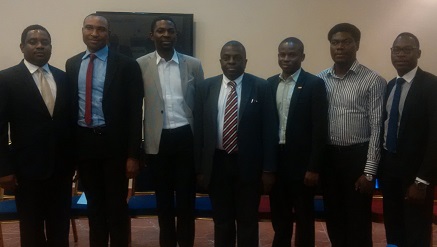News
IIBA-Nigeria, PwC Highlight Big Data Changing Business Analysts’ Role

The International Institute of Business Analysis (IIBA), (Nigeria), and the PwC have reiterated the need for business analysts to acquire the right skills and develop the right approach to leverage ever expanding concept of ‘BIG DATA’, to better enhance their organisations’ efficiency.
According to IIBA, the Business Analysts changing roles are evident in creating avenues for “stakeholders to understand the structure, policies and operations of an organisation and to recommend solutions that enable the organisation to achieve its goals”.
How Big Is Big Data?
According to the International Data Corporation (IDC), in 2011, 1.8Zetabytes, approximately 1.8 trillion Gigabytes of information were created worldwide; in 2012, the number reached 2.8Zetabytes and estimated to hit 40Zetabytes.
It is believed that 2.0Zetabytes of data is equivalent to 57million iPads.
Speaking at IIBA Nigeria- Lagos City Chapter, June 2015 meeting on the theme “The Enterprise Value of Big Data in Business Analysis”, Olusola Osinoiki, senior manager/ proposition lead, Enterprise Data Solutions, PwC, United Kingdom, said that the concept has become now pronounced following the emergence of cloud-based technology.
In live demo using World Beta technology to measure global data creation, he found that 74.8 billion active app sessions were recorded within an hour the IIBA meeting started.
According to him, in as much as the Internet will cause ‘disruptions’ in organisations and the society in general, the important of Big Data revolves around using right skills to harness accurate data to make informed decisions.
Meanwhile, a study by PwC tagged “Key Trends in Human Capital 2014: A New vision for Growth” told the story of a downturn with a very noticeable human capital impact that “those that had survived some harsh workforce cuts were left disengaged, with the youngest generation of workers suffering the most”.
“Today, the story is very different. The regions hit hardest are accelerating out of recession and organisations are focused again on growth. But the recovery has brought with it some familiar problems – low employee engagement, wage inflation in some markets and most importantly, skills shortages”.
In a similar study PwC found that availability of key skills and talents remains a priority for CEOs as 55% of them are determined to increase their headcounts in the next 12 months; 94% of whom are having robust diversity of strategy to place as a key step to solving their problems.
But, 73% of these CEOs are concerned about harnessing the right skills to drive growth, even as 64% CEOs fee their HR department is not well-positioned to address the changes required and opportunities for growth over the next 12 months.
How Big Data Change Business Analysis:
Taking a cue from the study, Osinoiki said that HR professionals and Business Analysts in Nigeria are expected to adapt to the new world of work as strategic workforce planning becomes a critical differentiator in organisations.
He said agility and business designs in organizations are data driven while business intelligence, IT, cloud computing, among others are impacting business decision making processes around the world.
To be more relevant in the new era, Osinoiki affirmed that Business Analysts must not shy away from “thinking of the impact of self service; turn unstructured data into actionable intelligence; turn structured data into applicable intelligence. The truth is that Big Data is not new. It has been with us, but the internet and mobile devices have revolutionised the concept. We must think and act fast to sure our relevance in our respective organisations and the trend will continue to grow”.
HR With The Power Of Data
“With the right skills; having access to a deep reservoir of ‘BIG Data’, provides an organisation with opportunities to gather ‘BIG Analytics’ for right decision making in terms of investments, delivering on business plans, keep abreast of regulations and diversifying processes to be in line with international standards”, the Guest Speaker said.
Speaking to Nigeria CommunicationsWeek at the Forum, John Ojurabesa, director, Sponsorship and Marketing, IIBA Nigeria, said that the concept of Big Data has completely changed the way business are currently managed and indeed the solutions the Business Analyst provide.
He said that the advent of cloud-based technology has ushered in an era where organisations are able to store and utilisevast amounts of data at a fraction of the cost and manpower required in the past.
“Current estimates suggest that we are creating over two quintillion bytes of data every day and approximately 90 per cent of the data that exists today was created in the past two years.
“Businesses have to respond to this growing amount of data and its complexity which include new risks and challenges of openness and security and the need to respond with instant feedback publicly like on Twitter businesses need to adapt to.
“With the right skills, access to a deep reservoir of big data provides organisations with the opportunity to gather ‘Big Analytics’ which in turn can provide CEOs with ‘Big Insights’ into their organisations,”Ojurabesa said.
The International Institute of Business Analysis (IIBA) is a non-profit professional association which commenced in October 2003 with the purpose of supporting and promoting the discipline of business analysis.
Over the years, IIBA helps business analysts develop their skills and further their careers by providing access to relevant content.
Thus, the Director, Sponsorship and Marketing, IIBA Nigeria, encouraged other Business Analysts in the country to join IIBA Nigeria, adding that, “When you join IIBA, you become part of a global network of Business Analysts practitioners, and have access to a range of valuable benefits.
“Joining demonstrates your commitment to professional development, and unlocks access to a range of networking and development opportunities, learning opportunities and discounts”.
News
Lasaco Assurance to Invest in Technologies, Systems to Deliver Value to Clients

Lasaco Assurance Plc, has said it would continue to invest in technologies and systems that delivers tangible value to clients and drive industry innovation.

Mr Abiodun Razzaq, Managing Director of Lasaco Assurance, who stated this at the 2025 customer forum organised by the company for its northern region customers in Abuja, said the forum’s interactive session offered an invaluable platform for open and constructive dialogue.
He said the forum brought together a distinguished assembly of customers, including policyholders, brokers, corporate clients, and industry partners, to engage in a robust dialogue aimed at enhancing service delivery and aligning offerings with the evolving expectations of the Northern market.
In his opening remarks, Regional Manager (Northern Region), Lasaco Assurance, Mr. Kunle Hamza underscored the company’s unwavering dedication to stakeholder engagement as a foundational pillar of its growth strategy. He emphazised that customer insights remain integral to shaping policies, refining service processes, and reinforcing the company’s brand promise.
He provided a compelling overview of Lasaco assurance’s recent performance and strategic priorities. He highlighted the company’s consistent premium income growth, bold digital transformation agenda, and ongoing operational restructuring designed to ensure responsiveness and resilience in a dynamic insurance landscape.
Addressing the customers, Mr. Adedayo Adetokun, Head of Strategy, affirmed that Lasaco assurance was actively developing multiple digital platforms to cater forvarious customer segments—part of a broader digital innovation roadmap that positions the company for future growth. He noted that human capital development was also being prioritised with targeted investments in talent acquisition and training to enhance operational capacity.
In his closing remarks, Mr. Muyiwa Anwoju, General Manager, Sales, expressed the management’s deep appreciation for the feedback received.
He assured participants that all contributions would be meticulously reviewed, categorised, and integrated into the company’s improvement plans. According to Anwoju, this forum marks the beginning of a renewed customer engagement framework, one that would be expanded across other regions in due course.
News
CAC Announces Upward Review of Service Fees

Corporate Affairs Commission (CAC) has announced an upward review of its service fees, which will take effect from August 1, 2025.

The announcement was made through the commission’s official social media page on Tuesday, June 17, 2025.
According to the CAC, the fee adjustment was necessary due to the current economic conditions, rising operational costs, and input from key stakeholders.
The statement read, “The Commission wishes to inform the General Public, Esteemed Customers, and all Stakeholders that in the continued efforts to improve its service quality and delivery, it has become necessary to review certain service fees effective the 1st day of August 2025.”
The commission explained that the fee changes are part of efforts to deliver better and more digitalised services while maintaining the integrity of Nigeria’s corporate registry.
The revised fee structure will affect services related to companies, business names, limited partnerships, and incorporated trustees.
Key fee changes announced by the Corporate Affairs Commission (CAC) include adjustments across various service categories.
For voluntary striking-off, the fee is now ₦50,000 for small companies and ₦100,000 for public companies, up from the previous ₦25,000.
Relisting a company will cost ₦50,000 for LTD/GTE and ₦100,000 for public companies.
Due diligence through self-service is set at ₦50,000. Requests for extension of time to hold an annual general meeting will now cost ₦100,000 for public companies and ₦50,000 for others.
Historical search reports will range from ₦20,000 to ₦30,000 per request. A restriction of a director’s residential address now attracts a ₦25,000 fee, while obtaining a certified true copy of documents or extracts will cost ₦5,000 per copy.
For limited partnerships, both voluntary striking-off and relisting will cost ₦25,000. A letter of good standing will be ₦10,000, registration and certified copies of documents will be ₦30,000, and a change of name will attract a ₦10,000 fee.
Regarding business names, voluntary striking-off is now ₦10,000, relisting ₦25,000, and an application for cessation ₦10,000. The certified true copy of documents will cost ₦5,000 each, and restriction of a proprietor’s address will also be ₦25,000.
Name reservations remain at ₦1,000, while reserved names with restricted words still cost ₦5,000.
The new fee structure is expected to impact business owners, lawyers, compliance officers, and others who interact with the corporate registry.
News
Global Travel Made Simple with Kaspersky eSIM Store

Kaspersky eSIM Store is a new connectivity solution for international travel. Designed to make it easier for leisure and business travellers to stay online globally, it empowers users with easy Internet access across 150+ countries and regions, with a choice of over 2,000 affordable data plans.

The production of eSIM-compatible devices has increased tenfold in the last five years according to the GSMA. By 2028, it is expected that half of all mobile connections worldwide will use eSIM technology.
This rise in popularity is driven by eSIM’s convenience and ease of use – eliminating the need for physical SIM cards and enabling a hassle-free experience wherever you go.
To meet this growing trend, Kaspersky eSIM Store provides access to eSIM plans from local telecom operators all over the world – with an easy interface and simple management.
A new way to always stay connected
Kaspersky eSIM Store lets users to enjoy affordable and easily accessible Internet connections around the globe without the hassle of physical SIM cards. Users can seamlessly access eSIM plans from local telecom providers in 150+ countries and regions worldwide, providing favourable rates and transparent conditions without any roaming fees.
While travelling, an eSIM can help users avoid high roaming costs on a primary SIM, remove the need to search for a local SIM kiosk and share personal data with them, as well as avoiding the use of unsecured public Wi-Fi networks.
Instead, eSIM ensures that leisure travellers can focus on the joyful moments of their trip and instantly share them with friends and relatives, while business travellers have continuous access to important messages, working documents and video calls.
Seamless connection in a few taps
Kaspersky eSIM Store features a user-friendly interface for plan selection, purchase, top-ups, and data usage management. Travellers can choose their preferred activation date, allowing them to set up their eSIM in advance and be connected the moment their trip begins — all in just a few taps.
To match the needs of any traveller, there are many flexible ways to choose and manage data plans.
Options are available based on destination, including plans for specific countries, global plan 122 destinations, or mini-global plans tailored to specific regions.
For trip duration, travellers can select between expiring plans valid for a fixed period or non-expiring plans that remain active until the data is fully used. This ensures convenience whether the trip is short or long.
Additionally, users have control over when their plan starts. They can either schedule activation for a specific date or begin using the data immediately, providing flexibility to align with their travel schedule.
To ensure users never run out of GB unexpectedly, Kaspersky eSIM Store provides real-time data usage monitoring and alerts when a balance is near zero. The user profile (on the webpage or in the app) allows quick top-ups and supports multiple countries on a single eSIM – install once and use for a lifetime.
Kaspersky eSIM Store is launched in partnership with award-winning provider BNESIM Limited, which has been delivering global eSIM services since 2017.
“At Kaspersky we are constantly keeping up with latest trends shaping our digital habits, and eSIM is definitely one of them. eSIM technology greatly simplifies travelling abroad, allowing people to stay connected and not worry about issues like roaming charges.
“We know from our own experience how important it is to stay in touch with your family or colleagues when you are on a trip, so we designed Kaspersky eSIM Store for all types of travellers to ensure instant access to eSIM data plans wherever they go, as well as to provide a safe and positive digital experience,” – Mikhail Gerber, Executive Vice President, Consumer Business, Kaspersky.
Kaspersky eSIM Store complements Kaspersky’s wide range of industry-recognised solutions, such as Kaspersky VPN Secure Connection and Kaspersky Premium. Together they cover all modern connectivity needs and enhance digital freedom – ensuring safe, worry-free connectivity across the world.

 Telecom1 day ago
Telecom1 day agoALTON Clarifies on Migration to End-User Billing for USSD Services

 Telecom2 days ago
Telecom2 days agoGSMA, Mobile Industry Call for Strengthened Action to Advance Child Online Protection in Africa

 News2 days ago
News2 days agoDigital Africa Global Consult, NDPC Partner on Ground-Breaking “Nigeria Data Challenge” Initiative

 General News2 days ago
General News2 days agoTD Africa, HP Strengthen Partnership to Advance Africa’s Tech Ecosystem

 E-Financial1 day ago
E-Financial1 day agoNigerian Stock Market Suffers ₦183 Billion Loss Amid Profit-Taking

 News1 day ago
News1 day agoDStv Rewards Loyal Customers with Free Package Upgrades

 Telecom1 day ago
Telecom1 day agoLagos Future Conference 2025: Stakeholders Call for Digital Responsibility and Grassroots Innovation

 General News1 day ago
General News1 day agoAfrican Parliamentarians Seek Answers from Telcos on Quality of Service




























